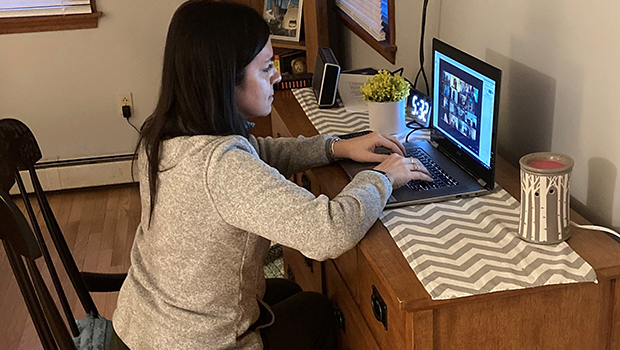Legislators don’t know what goes on in classrooms every day unless they hear from teachers. That’s why CEA members around the state have been meeting with legislators this winter to share their stories and urge legislative support for key issues.
During a Zoom meeting yesterday with shoreline educators, Senator Norm Needleman and Representatives Devin Carney and Christine Palm heard from teachers about the need for more mental health supports in schools, better indoor air quality, support for recruiting and retaining educators, and improvements to the state teacher evaluation guidelines. [Above, Marlborough teacher Amy Farrior takes part in an evening Zoom meeting with her legislators.]
“Schools really need more funding to support the mental health of children,” one teacher told the legislators.
Another shared that the preschool teacher at her elementary school is at a loss for what to do with three-year-olds who hit and kick her. “She has one para in the room with her and 17 three-year-olds. Schools need board certified behavior analyst support, they need social workers, they need mental health resources.”
She added, “School are really floundering in the mental health department. Kids are struggling. They’ve gone through two years now of a world unlike any other. The supports we need are fewer and fewer, even as they’re needed more and more.”
Another teacher told legislators that earlier in her career she was put in a headlock and her neck was twisted while teaching summer school. Her recovery required six months of physical therapy.
“It was scary,” the teacher said. “I still have PTSD and physical problems resulting from the attack. The safety of teachers should be foremost.”
A high school teacher said her district has had many teachers leave the profession earlier than they had planned. “We thought teaching last year, half in and half out, was the hardest year of teaching we could experience, but the behaviors this year from students—they’re out of control.”
On top of responding to the stresses and upheavals in students’ lives and how those present in the classroom, the teacher said she and her colleagues are being asked to teach additional classes and take on more responsibilities because of a teacher shortage.
After a math teacher retired at the beginning of the year, other math teachers in her building were asked to teach an extra class to make up for that missing position, and now language teachers are being asked to teach an extra class after a Spanish teacher left.
“I have a very dedicated colleague telling me every day, ‘Maybe now is the time to leave,’ and she wasn’t thinking that two years ago. We need to work to retain teachers. I don’t even know what’s going to happen next year at our school. I’m very concerned.”
When teaching is already stressful, extreme heat makes everything that much worse. An elementary teacher told legislators that the heat in her classroom is extremely oppressive from August through October and in May and June. “We don’t have air conditioning, and these poor little eight-year-olds are coming in from recess dripping. They’re nauseous and have headaches—these poor kids are so uncomfortable.”
“I’ve been teaching for 23 years at my school, and in the past, whenever we’ve brought up concerns about excessive heat, the response has been, ‘It’s only a few days,’” a middle school teacher said. “It’s not just a few days. Kids get headaches, they have to go to the nurse. Teachers get migraines, too. Kids can’t learn and teachers and can’t teach—it’s inhumane.”
In response to a question from Rep. Palm teachers confirmed that, due to climate change, the challenge of extreme heat and humidity in schools is getting worse. Schools from the 1960s and 70s were not built with the temperatures of 2022 in mind, and do not have air conditioning.
“Teachers are overwhelmed,” another teacher shared. “Between hot buildings, more and more expectations being heaped on teachers, supporting the significant social and emotional needs of children, and being caught in the middle of political debates, we’re exhausted. On top of that we have to comply with teacher evaluation systems that don’t meaningfully impact our teaching or student learning yet require hours and hours of jumping through hoops and data entry time.”
“As a society we need to rejigger our priorities,” Senator Needleman said. “You guys are really heroes. The situation on the ground, sadly, is what it is. We need to do better, and I’m committed to doing better to the extent we can get there.”
Rep. Carney said he would like to see progress on the issues teachers shared. “The one that’s particularly alarming to me is students attacking teachers. We need to address that.”
A middle school teacher said he felt particularly frustrated after attending board of education meetings where the primary focus of many meetings has been masks.
“These things teachers are concerned about, the lack of supports for students, the lack of AC, are not a priority for our elected town officials,” he said. “I have 25 kids, several with IEPs and several who are English learners. I don’t have a para in my room at any point, so I can only give each of those students a couple of minutes of individual attention, at best. This is so hard. I’ve been teaching for 10 years—why is the school board talking about completely different matters?”
Rep. Palm thanked teachers for communicating what is really going on in schools. “I appreciate you elucidating all these things that are really on your minds.”
To schedule a meeting with legislators in your area, contact your local president or CEA Political Engagement Coordinator Gus Melita at [email protected].







